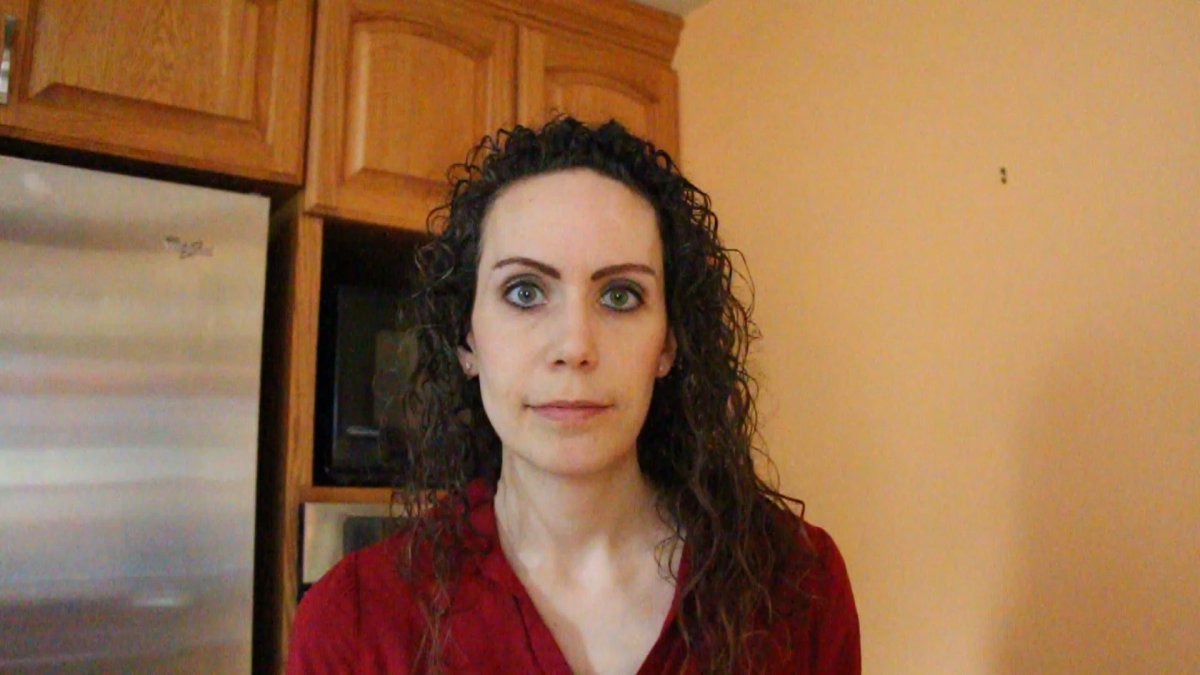Sara Handrigan’s one-year wedding anniversary was coming up.

Her husband lived in the U.S., so in mid-March, the then-29-year-old left her home in Welland, Ont., and went to meet him in Niagara Falls, New York to celebrate.
That’s where she thinks she contracted COVID-19.
She started feeling sick a few days later. First, it was a cough. “I woke up the next morning just feeling awful. I had a fever. I had a headache. I felt muscle weakness, and then, super tired, like fatigue. It just sort of hit like a ton of bricks,” she said.
Since she was living with others in Welland, she moved to a house in Burlington to recuperate, as her illness got steadily worse, with a fever and extreme fatigue that made it hard to move.
She managed to get tested, and sure enough, she had COVID-19. “The fever went away after three or four days and never came back. But the cough, the chest tightness and the fatigue sort of persisted long term.”
But she started to feel better, she said, and eventually she got tested again.
It was still positive.
The symptoms came back too. “The shortness of breath came in really bad,” she said. “Just to the point where I was putting my trash bins, putting the garbage outside, and at the end I was winded.”
Over the next two months, up to now, she said, she has suffered waves of symptoms, including lingering fatigue, brain fog and shortness of breath.

She tested positive three times over the last few months, and even now that she has finally tested negative, the symptoms haven’t gone away.
“Public health doesn’t really know. They’ve called me an anomaly this whole time because I should have recovered back in early April. But I kept having symptoms and I kept testing positive.”
Handrigan isn’t alone. Groups have sprung up online, filled with “recovered” COVID-19 patients who say they haven’t actually recovered — and are still suffering intermittent symptoms of the disease.
Among them is Lisa Audet, 41, from Thunder Bay, Ont. While she never tested positive for the disease — early in her illness, tests were harder to come by — she believes she had it.
In early March, she had what she called “mild symptoms” of fatigue and cough. “March 24, I got hit with what felt like the worst flu I’ve ever had in my life,” she said. “So it kind of changed on that day. And I was on the couch completely with that intense malaise, intense fatigue, body aches, chest tightness. Also, my eyes were stinging.”
This lasted for a little more than a week, “And then that lifted and I started to feel better and I thought I was done with everything. And then April 25, I got hit with a ton of bricks.”
The symptoms came back again a month after that, and she’s still not done with the illness, she said.
- Buzz kill? Gen Z less interested in coffee than older Canadians, survey shows
- Naloxone-resistant street drug linked to 9 deaths in Eastern Canada seized in Alberta
- Bird flu risk to humans an ‘enormous concern,’ WHO says. Here’s what to know
- ‘She gets to be 10’: Ontario child’s heart donated to girl the same age
Her 12- and 14-year-old daughters have also suffered from symptoms for months, she said, albeit a milder version of her own.
Emily Bodechon from Quispamsis, N.B., doesn’t think she gave COVID-19 to her two children, but she too complains of symptoms that have gone on for months after she tested positive for the disease.
“It’s been a rollercoaster, really,” she said. “I’m 45 years old, and I’ve never been sick –not like this.”
“I think the scariest part for me is that I was really healthy going into it. You know, I went to the gym three times a week. I’m a runner.” She wonders what would have happened to her if she was in poorer health to begin with.
Unfortunately, there isn’t much research on how long symptoms of COVID-19 last, said Craig Jenne, an infectious disease researcher and associate professor at the University of Calgary.
“I think the important one for these poor patients is they’re not crazy,” he said. “There definitely is a cohort of patients that have conditions that extend out even beyond a month, getting out into the six, seven weeks of symptoms.”
A handful of mostly small studies have described the existence of cases where patients had symptoms or were shedding virus for longer than 20 days, though they appear to be a fairly small percentage.
A recent preprint, not yet peer-reviewed study of patients in Atlanta, Georgia, noted that reported symptoms “remained common” after three weeks. The study “highlights the persistence of symptoms that may interfere with usual activity, such as shortness of breath with exertion,” the authors wrote.
In many of these patients, symptoms “appear to wax and wane,” Jenne said.
“So they’ll have sort of attacks or flares and then it’ll go away. And throughout this time, people have been shown to test positive for the virus. So it seems as though that they don’t actually clear all the virus.”

But there are still many important unanswered questions, he said, such as how common this is, how long symptoms can last, who is more susceptible to having long-term symptoms, and whether patients remain infectious the whole time — though he thinks data so far suggests this last is unlikely.
“We’re starting, I think, to get a glimpse of what this disease actually is,” said Jason Kindrachuk, assistant professor and Canada Research Chair in emerging viruses at the University of Manitoba.
Some people who experienced severe illness do appear to have long-term damage from the disease, he said. And because the virus is so new, “We’re in this weird timeframe where we’re just not far enough into the recovery phase of these patients to get an idea of how much is going to resolve over time and how much is going to continue to be compromised.”
Other viruses do linger in some patients, he said, and the novel coronavirus might be the same.
“This virus does cause severe disease or has the potential to cause severe disease for pretty much everybody,” Jenne said. “And we still don’t even have for the average disease, let alone these ‘long-haulers,’ any way of predicting who’s safe and who’s not safe and who’s at the most risk of severe illness.”
People keep asking Sara Handrigan when she’s going to get better and back at work, surprised that such a young woman is still sick from COVID-19, she said.
“And, well, I don’t know. I have no sense of whether I’m going to improve next week, next month, next year. There’s no answers.”
Questions about COVID-19? Here are some things you need to know:
Symptoms can include fever, cough and difficulty breathing — very similar to a cold or flu. Some people can develop a more severe illness. People most at risk of this include older adults and people with severe chronic medical conditions like heart, lung or kidney disease. If you develop symptoms, contact public health authorities.
To prevent the virus from spreading, experts recommend frequent handwashing and coughing into your sleeve. They also recommend minimizing contact with others, staying home as much as possible and maintaining a distance of two metres from other people if you go out. In situations where you can’t keep a safe distance from others, public health officials recommend the use of a non-medical face mask or covering to prevent spreading the respiratory droplets that can carry the virus.
In situations where you can’t keep a safe distance from others, public health officials recommend the use of a non-medical face mask or covering to prevent spreading the respiratory droplets that can carry the virus.
For full COVID-19 coverage from Global News, click here.








Comments